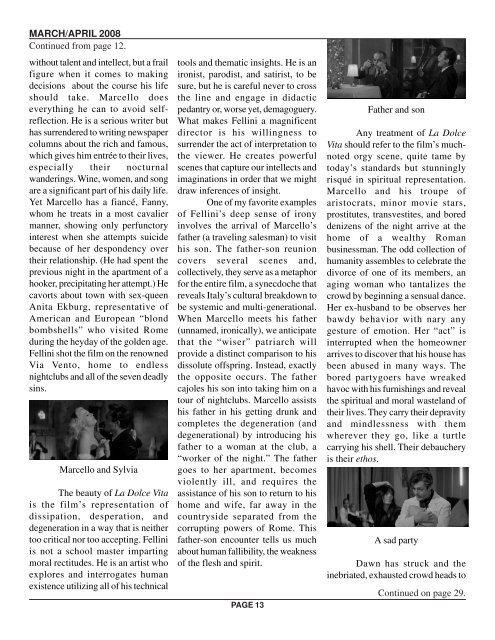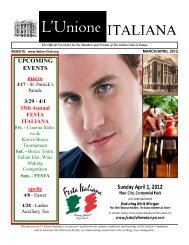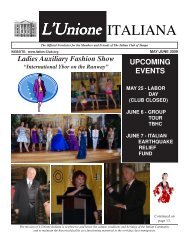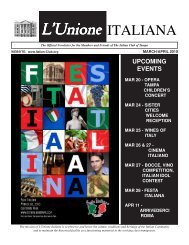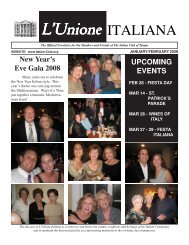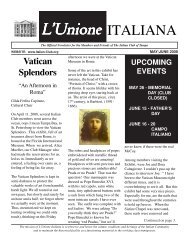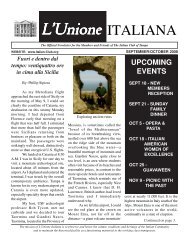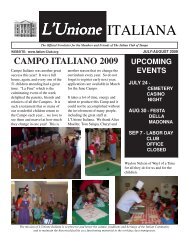MARCH/APRIL 2008L’Età dell’oro delcinema italianoPhillip SipioraMy last column explored thecritical importance <strong>of</strong> the greatNeorealist period in <strong>Italian</strong> Cinema,a genre that lasted from the early1940s until the mid 1950s. Manydevotees <strong>of</strong> <strong>Italian</strong> cinema believethat this cinematic stage was the truehigh point <strong>of</strong> moviemaking in Italy.However, a strong argument can bemade for the strategic significance <strong>of</strong>the interval that followedNeorealism, the stretch between1958 and 1968, a period referred toby <strong>Italian</strong> film scholars as “<strong>The</strong>Golden Age <strong>of</strong> Cinema”What was “golden” aboutthis ten-year span? Most <strong>of</strong> the greatNeorealist directors were still makingmovies, yet <strong>Italian</strong> audiences hadgrown tired <strong>of</strong> Neorealistic themesand plots. First, bombed out citiesand partisan portraits had becomecommonplace fare in Neorealism andaudiences thirsted for somethingnew, something radically differentfrom the movies that had captured thehearts and minds <strong>of</strong> young and old.Second, there was massive declinein American films exported to Italycoupled with a significant increasein the production <strong>of</strong> <strong>Italian</strong> films,which historically had beendominated by American imports,especially epics, that so many <strong>Italian</strong>swere drawn to. Indeed, by the end <strong>of</strong>the 1960s <strong>Italian</strong> box <strong>of</strong>fice revenuehad climbed to about two-thirds <strong>of</strong>all film revenue. American filmrevenue dropped to a little more than10%, having fallen from owningmore than 50% <strong>of</strong> the <strong>Italian</strong> marketprior to he 1960s. Significant changewas in the wind.<strong>The</strong> Golden Age introduceda dramatic new shift in themes, plots,and techniques and the citizens <strong>of</strong>Italy were well primed for the newcinema. Economic times in most <strong>of</strong>Italy, especially the North, weregenerally good, particularly incomparison to the widespreadpoverty <strong>of</strong> the post-war period. <strong>The</strong>tastes <strong>of</strong> audiences had evolved, too.It is accurate to say that <strong>Italian</strong>viewers became more sophisticatedas a much wider range <strong>of</strong> filmsbecame available.<strong>Italian</strong> audiences werecaptivated by the groundbreakingcinema <strong>of</strong> Commedia all’ italiana,which provided a darker, more ironic,comic view <strong>of</strong> life that openlyconfronted the new struggles <strong>Italian</strong>sfaced as their culture(s) facedsignificant alteration as a result <strong>of</strong> thesocial, cultural, and economicrealignments and transformations <strong>of</strong>the post-war years. Whereas“commercial” or “mainstream”cinema had characterized many <strong>of</strong>the movies made before the late1950s, another new kind <strong>of</strong> filmentered the marketplace—the “artfilm.” This new kind <strong>of</strong> cinemacaptured the imagination <strong>of</strong> thepublic, drawing audiences far beyondstudents, pr<strong>of</strong>essors, film critics, andforeigners.La Dolce Vita, perhapsFederico Fellini’s greatestmasterpiece, was made in 1959 andstunned not only <strong>Italian</strong> audiences,but moviegoers around the world.PAGE 12Fellini’s film is a radical departurefrom Neorealist concerns for nationalsurvival, economic subsistence, andthe rights <strong>of</strong> struggling individuals.Opulence, decadence, and bitterirony dominate the motifs andcharacters <strong>of</strong> La Dolce Vita. <strong>The</strong> titleitself, “<strong>The</strong> Sweet Life,” cannot betaken without a powerful sense <strong>of</strong>wry, sardonic irony.<strong>The</strong> original title <strong>of</strong> La DolceVita was 2000 Years after JesusChrist, a name that perhaps bettercaptures Fellini’s concern fordepicting an Italy that is in a state <strong>of</strong>disintegration: spiritual, cultural,ethical, and social. <strong>The</strong> openingscene is strategically important. Ahelicopter carrying a statue <strong>of</strong> Christinto Rome is trailed by anotherhelicopter carrying Marcello, agossip columnist, and hisphotographer. This scene reveals aconflation <strong>of</strong> the sacred and thepr<strong>of</strong>ane. Marcello, a playboy <strong>of</strong> thenight, flirts with women in bikinis ona ro<strong>of</strong>top below the airborne statue,although his assignment is to coverthe arrival <strong>of</strong> the Christian icon. Thisearly metaphor, the confusion <strong>of</strong>Christian iconography with rampant(and mindless) hedonism, is one <strong>of</strong>the film’s major themes. Scenes suchas this one leave a powerful residue<strong>of</strong> intellectual and spiritual poverty.Opening Scene<strong>The</strong> plot <strong>of</strong> La Dolce Vita issimple. It chronicles a few nights inthe life <strong>of</strong> Marcello, a man notContinued on page 13.
MARCH/APRIL 2008Continued from page 12.without talent and intellect, but a frailfigure when it comes to makingdecisions about the course his lifeshould take. Marcello doeseverything he can to avoid selfreflection.He is a serious writer buthas surrendered to writing newspapercolumns about the rich and famous,which gives him entrée to their lives,especially their nocturnalwanderings. Wine, women, and songare a significant part <strong>of</strong> his daily life.Yet Marcello has a fiancé, Fanny,whom he treats in a most cavaliermanner, showing only perfunctoryinterest when she attempts suicidebecause <strong>of</strong> her despondency overtheir relationship. (He had spent theprevious night in the apartment <strong>of</strong> ahooker, precipitating her attempt.) Hecavorts about town with sex-queenAnita Ekburg, representative <strong>of</strong>American and European “blondbombshells” who visited Romeduring the heyday <strong>of</strong> the golden age.Fellini shot the film on the renownedVia Vento, home to endlessnightclubs and all <strong>of</strong> the seven deadlysins.Marcello and Sylvia<strong>The</strong> beauty <strong>of</strong> La Dolce Vitais the film’s representation <strong>of</strong>dissipation, desperation, anddegeneration in a way that is neithertoo critical nor too accepting. Felliniis not a school master impartingmoral rectitudes. He is an artist whoexplores and interrogates humanexistence utilizing all <strong>of</strong> his technicaltools and thematic insights. He is anironist, parodist, and satirist, to besure, but he is careful never to crossthe line and engage in didacticpedantry or, worse yet, demagoguery.What makes Fellini a magnificentdirector is his willingness tosurrender the act <strong>of</strong> interpretation tothe viewer. He creates powerfulscenes that capture our intellects andimaginations in order that we mightdraw inferences <strong>of</strong> insight.One <strong>of</strong> my favorite examples<strong>of</strong> Fellini’s deep sense <strong>of</strong> ironyinvolves the arrival <strong>of</strong> Marcello’sfather (a traveling salesman) to visithis son. <strong>The</strong> father-son reunioncovers several scenes and,collectively, they serve as a metaphorfor the entire film, a synecdoche thatreveals Italy’s cultural breakdown tobe systemic and multi-generational.When Marcello meets his father(unnamed, ironically), we anticipatethat the “wiser” patriarch willprovide a distinct comparison to hisdissolute <strong>of</strong>fspring. Instead, exactlythe opposite occurs. <strong>The</strong> fathercajoles his son into taking him on atour <strong>of</strong> nightclubs. Marcello assistshis father in his getting drunk andcompletes the degeneration (anddegenerational) by introducing hisfather to a woman at the club, a“worker <strong>of</strong> the night.” <strong>The</strong> fathergoes to her apartment, becomesviolently ill, and requires theassistance <strong>of</strong> his son to return to hishome and wife, far away in thecountryside separated from thecorrupting powers <strong>of</strong> Rome. Thisfather-son encounter tells us muchabout human fallibility, the weakness<strong>of</strong> the flesh and spirit.PAGE 13Father and sonAny treatment <strong>of</strong> La DolceVita should refer to the film’s muchnotedorgy scene, quite tame bytoday’s standards but stunninglyrisqué in spiritual representation.Marcello and his troupe <strong>of</strong>aristocrats, minor movie stars,prostitutes, transvestites, and boreddenizens <strong>of</strong> the night arrive at thehome <strong>of</strong> a wealthy Romanbusinessman. <strong>The</strong> odd collection <strong>of</strong>humanity assembles to celebrate thedivorce <strong>of</strong> one <strong>of</strong> its members, anaging woman who tantalizes thecrowd by beginning a sensual dance.Her ex-husband to be observes herbawdy behavior with nary anygesture <strong>of</strong> emotion. Her “act” isinterrupted when the homeownerarrives to discover that his house hasbeen abused in many ways. <strong>The</strong>bored partygoers have wreakedhavoc with his furnishings and revealthe spiritual and moral wasteland <strong>of</strong>their lives. <strong>The</strong>y carry their depravityand mindlessness with themwherever they go, like a turtlecarrying his shell. <strong>The</strong>ir debaucheryis their ethos.A sad partyDawn has struck and theinebriated, exhausted crowd heads toContinued on page 29.


